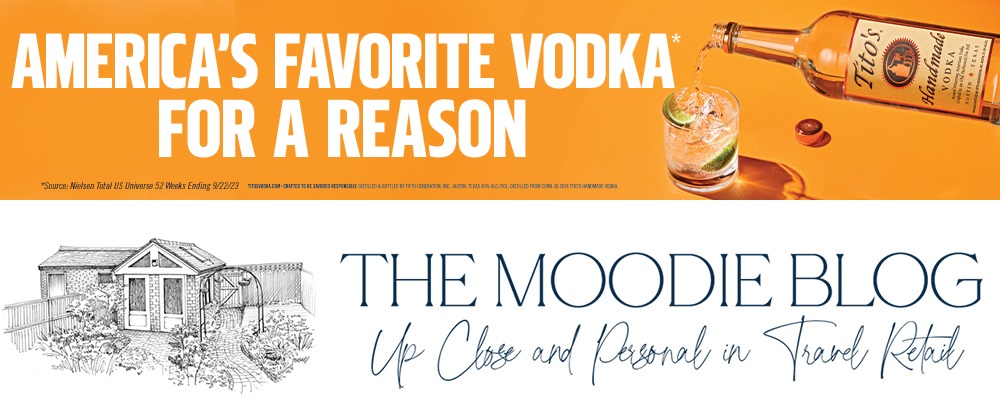Latest posts by Martin Moodie (see all)
- Minns det som igår min vän – Remember it like yesterday my friend - December 31, 2024
- Time to paws Petsonality as Tito’s Handmade Vodka unleashes support for The Moodie Blog - December 22, 2024
- On the road to Mandalay where the Flying Kiwis play - December 15, 2024
For just about everyone in travel retail, as with the world at large, everything has changed. All the old certainties that we’ve each long relied on have flown out the window.
Passenger traffic growth. A given, right? No longer. Right now, many people cannot travel to many destinations around the world. And countless others do not wish to.
Travel retail’s geographic diversity is a guaranteed insulator against crisis, correct? Not with a global pandemic, especially one that is sweeping the world with such speed and ferocity, spreading panic and illness in just about equal measure.
Chinese spending will underpin the growth of travel retail for years to come, especially given the size of the population, its growing wealth and the fact that millions of its people are yet to travel abroad. How many times have I heard that said at industry conferences? How many times have I said it myself? Well all of must think again. For while the Chinese most certainly will travel – and shop – in large numbers again, and comparatively soon, for some time most will be highly selective where they do it.
“Martin, it’s the uncertainty,” said one leading retailer CEO. “We just do not know what’s going to happen.”

People all around the world, from Iran to Italy, from the UK to the US, from South Korea to Spain, and Sweden to Switzerland, are coming to terms with the alarm, fear and day to day repercussions that the people of China have been living with for many weeks. Everything is changing with bewildering speed, including millions of people’s perspective on this disease.
This week, as always, I chatted – either by phone, email, WeChat, or other platforms – with a number of industry leaders. For the first time I noticed something different. It was difficult to sum up but I will choose the word ‘distraction’, a combination of bewilderment, sense of duty, and simple human concern. It was as if each of them was simply trying to come to terms with the change to the human condition as much as they were trying to navigate the immediate future of their businesses. “Martin, it’s the uncertainty,” said one leading retailer CEO. “We just do not know what’s going to happen.”
“The situation is extraordinary in the proper sense of the word,” said the global head of one of our industry’s leading brand houses, who pointed out that his and his company’s overwhelming priority was the health and safety of employees.
I understand. I am a business owner, whose sole livelihood – like that of my business partner Dermot Davitt and our team – lies with the travel retail sector. I, like those business leaders I spoke to, am worried about my team, my company, and, yes, myself. Personally I am in the high-risk category, having had my spleen (a key part of the body’s immune system) removed when I had stomach cancer in 2010. Thus it’s hardly reassuring to hear the UK’s chief scientific adviser saying that the government wants 60% of the population to catch COVID-19 in order to create a ‘herd immunity’ to prevent the virus becoming an annual crisis.
Perhaps he is right. But for me and all the others whose immune systems are compromised by age, illness or condition, his words are simply further cause for alarm.
To stay or to go? I am lucky, I have a choice. Most do not. The people of Wuhan did not. The people of Lombardy do not.
As the situation deteriorated over the past few days, I debated flying to Hong Kong, now emerging from the darkest days of the outbreak and where the authorities and the people are being rightly lauded for keeping the virus numbers low. My wife and I have a base there and – spleen or no spleen – it simply seems a safer place to be.
While I contemplated making a flight booking yesterday, news came through that Hong Kong had imposed quarantine restrictions on travellers entering from certain European countries. After hurriedly checking, I discovered the initiative applied just to Schengen states but it may only be a matter of time before the UK (where the confirmed cases tally has soared in recent days to 801) is added to the list.
Unlike the people of Hong Kong, battle-hardened by the harrowing experience of SARS in 2003, the British, like many of their European counterparts, are not well-prepared. Perched so close to the original epicentre of the crisis, Hong Kong rapidly put social distancing in place amid a whole range of regulated and commonsense measures. The result? As of 24.00 on 13 March, only 137 cases have been reported. In contrast, the UK tally is expected to soar in coming weeks. Schools, controversially, remain open, and many people are still dismissive of self-protective measures.
What to do? Knowing that the UK might be added to the Hong Kong restriction list yesterday, my thoughts swung like a pendulum. To stay or to go? I am lucky, I have a choice. Most do not. The people of Wuhan did not. The people of Lombardy do not. In the end I was influenced by one of those business leaders, who told me he had cancelled all flights as he needed to remain at the helm and be with his people. Reluctantly, I have made the same choice. Is it the right one? Who knows? Nothing is certain anymore.



You must be logged in to post a comment.